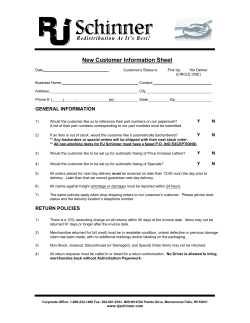
IKEA wels/austria - LTW Intralogistics
PROJECT REPORT 01/2010 IKEA wels/austria PROJECT REPORT 01/2010 CAREFULLY CALCULATED MODERNIZATION BOOSTS THE CUSTOMER The creativity of IKEA, the multinational furniture group, has been driven by logistical challenges since its earliest days. It was in 1956 that Ingvar Kamprad, who founded the firm in Sweden’s sparsely populated southeastern region of Småland, began dispatching items of furniture by post – and invented the famous flat pack for that purpose. Today IKEA is the furniture market’s leading brand operating 267 furniture stores in 39 countries serviced from 43 central warehouses, employing 123,000 people, offering 9,500 products bought in from 1,220 suppliers, and occupying a total of 4 million m3 of storage space – making it one of the world’s largest warehouse users. This LÖVET table with detachable legs was the first piece of IKEA furniture to be packed flat – way back in 1956. retrofit by ltw BACKGROUND IKEA’s distribution centre for Central and Eastern Europe was commissioned in 1989, which was also the year of great political upheaval, at the rail terminal in the Austrian town of Wels. The layout of the manually controlled high-bay warehouse, with 20 rack lanes and one switching aisle, followed the example set in Älmhut, Sweden. For its storage and retrieval machines (SRM) IKEA relied on a new partner with innovative switching technology, namely LTW, which at first installed three SRMs and then – thanks to IKEA’s dynamic development – supplied a further seven SRMs within two years. Werner Kraft, Maintenance Manager at IKEA Wels: “The implementation went just as perfectly as the planning. After twenty years of working with LTW I would not have expected anything else”. Since then LTW has worked with IKEA on three continents and installed more than 220 storage and retrieval machines in 11 countries. THE IDEA Two developments led, in the middle of 2007, to a radical rethink at IKEA Wels. On the one hand, after nearly 20 years of reliable operation, the first bottlenecks in supplying spare parts appeared. On the other hand the delivery regions within the group were re-distributed. The Wels distribution centre now concentrates of the Austrian and Swiss markets, as a result of which a sharply rising need for capacity is emerging. The Wels logistics team consulted the IKEA logistics planners who control the The high-bay warehouse stands underneath Wels airport’s landing path. The scenario of adding a storey to the warehouse was ruled out after lengthy negotiations. IKEA WELS/AUSTRIA group’s global logistics. A complete range of scenarios was jointly examined, right through to building on a second storey or demolishing the existing warehouse and rebuilding it to twice its height. In addition to the costs it was, in the end, the lack of space between the railway and the airport that made such radical solutions impossible. Conversion to fully automatic operation, given the fixed size of the warehouse, turned out to be insufficiently profitable. After eighteen months of planning the advantages of modernizing the existing installation won through: favourable cost/benefit ratio while retaining flexibility with respect to budget and performance aspects; no approval procedures; no costly training programmes; and operations continuing while equipment was converted. Together they specified the components to harmonize performance, certainty of spare parts supply and availability to the strongest possible effect: control, driving and hoisting drive, rail system in the switching aisle, bus bar and movable cables, ergonomics of the driver’s cabin and service unit. The conversion was achieved in eight weeks during which operations continued unaffected. At any one time eight of the ten storage and retrieval machines were in use over two shifts. The 8-man LTW team renewed the rail system and the points in the switching aisle in stages in the course of three weekends that were extended by public holidays. The details of the Retrofit programme were fixed rapidly and pragmatically thanks to IKEA’s well-rehearsed cooperation with LTW’s service team. That such ambitious timing was completely successful was down, in the first place, to careful planning but also owed much to both partners’ flexibility and commitment. And to particular experience – as all the ten storage and retrieval machines that the LTW team was making fit for the future today had, after all, been installed twenty years ago by the team manager himself. The newly developed folding seat with swivelling joysticks can also be used as a fixed- seat, ergonomic workstation in the order picking area of the warehouse. Current (2009) switching technology with redesigned rail-switching drive and rail switches. The new points are built to minimize wear and tear. IMPLEMENTATION After just three days of conversion work and testing this storage and retrieval machine, which now has a S7-switch cabinet and new driving and hoisting drives, was again ready for immediate use. OUTLINE OF THE PROJECT LTW Intralogistics GmbH Austria Achstrasse 53 6961 Wolfurt T + 43 5574 6829 – 0 F + 43 5574 6829 – 29 office@LTW.at www.LTW.at LTW Intralogistics GmbH Germany Max-Eyth-Strasse 30 89171 Illerkirchberg STORAGE AND RETRIEVAL MACHINES (SRM) > 1 0 aisle-switching, manuallycontrolled SRMs > Driving speed: 130 m/min > Driving acceleration: 0.5 m/s 2 > Hoisting speed: 25 m/min > Hoisting acceleration: 0.5 m/s 2 > Load handling device: telescopic fork MATERIALS HANDLING TECHNOLOGY > Front side rack with handover bays for manual forklift operations SOFTWARE > Radio terminals in the SRM cabins coupled with the IKEA forklift guidance system T + 49 7346 3084 F + 49 7346 3083 office@LTW.at www.LTW.at LTW Intralogistics, Inc. USA 3285 North George Street PO Box 0115 Emigsville PA 17318 – 0115 T + 1 717 767 7210 F + 1 717 326 1279 office@LTWUSA.com www.LTWUSA.com 012010/E directed by transfair HIGH-BAY WAREHOUSE (HBW) > Year of construction: 1989 > Galvanized steel rack > L x W x H: 84 x 90 x 14 m > 20 rack lanes, 1 switching aisle > Single-depth storage > Approx. 28,000 pallet spaces > Maximum payload: 1,000 kg
© Copyright 2025









